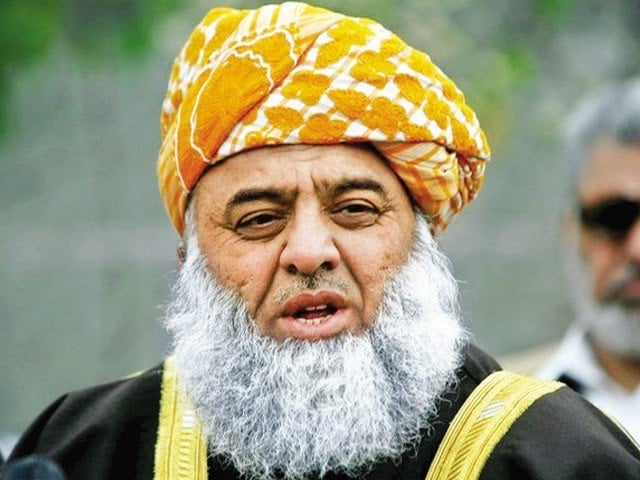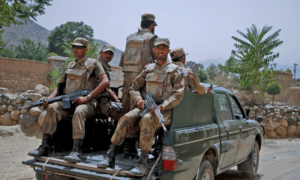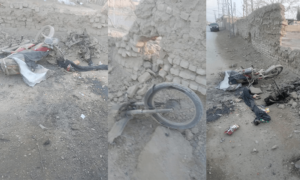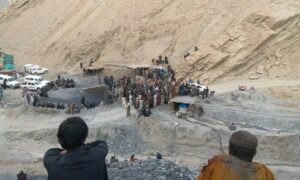ISLAMABAD:
After years of political bickering, key political players have reached a consensus that talks are the only way forward for bringing much-needed political and economic stability in the country and countering internal and external challenges, it emerged on Friday.
Amid talks between the PML-N-led government and the opposition PTI, JUI-F chief Maulana Fazlur Rehman is the latest to support the process, saying talks between political parties “are an important part of the democratic process” and they should be continued.
The JUI-F chief, while talking to the government negotiation committee’s spokesperson Senator Irfan Siddiqui, said that avoiding reconciliation and refusing to negotiate with political forces was an undemocratic behaviour, emphasising that major issues can only be resolved through dialogue.
Before Maulana-Siddiqui meeting, PTI Secretary Information Sheikh Waqas Akram held a news conference to emphasise that the PTI will continue to engage in talks with the ruling coalition even if founding PTI chairman Imran Khan was awarded sentence in the £190 million corruption reference on January 6.
PTI information secretary’s statement has come after the party had adopted a wait-and-watch policy to see the judgment in the National Accountability Bureau (NAB)’s corruption reference against Khan and others, including his wife.
Following the second meeting between the government and PTI on January 2, it had emerged that PTI was taking time to present its charter of demands in black and white, citing that instructions from the party’s incarcerated leader were needed to move ahead.
Meanwhile, PTI’s vice chairman Shah Mahmood Qureshi while talking to reporters during his appearance in an anti-terrorism court in Lahore stressed the need for negotiations between the two sides, saying dialogue is not the need of PTI but Pakistan.
The former foreign minister, who has been in jail following the May 9 incident, warned that the failure of the ongoing negotiation process could endanger democracy in the country. Qureshi said that Pakistan stands at a critical juncture and all democratic forces should seriously take talks process forward.
Qureshi said that PTI’s demands – jailed workers and ex-PM Imran Khan be immediately released; a judicial commission be constituted to investigate May 9 and November 26 events – were not unreasonable. He, however, warned that the government will crumble if the outcome of talks was not positive.
Earlier, Senator Siddiqui had also said that the government will consider written demands of the PTI without paying heed to Imran Khan or anybody else’s statements. The senator had termed the meeting between PTI and PMLN along with other political parties, a mere act of sitting together was itself a major breakthrough.
Siddiqui had also said that Ministry of Interior was conveyed on the very first day to facilitate the members of PTI’s negotiating committee regarding their meeting with Khan and that this facilitation will also continue in the future.
The rare cross-party consensus has emerged on the heels of government-PTI talks that started on December 23, 2024, to address political tensions that have gripped the country for far too long. Though high hopes are attached to government-PTI talks, things haven’t gone beyond verbal discussions so far in the first two meetings.
Nevertheless, the initiation of dialogue reflects a shift in political dynamics, as both sides appear willing to explore a negotiated solution to the impasse. PTI’s softened stance in Parliament, coupled with Imran Khan’s directive to form a five-member negotiation team, had prompted the government to reciprocate by forming its own committee.
Once PTI presents its charter of demand, the ruling coalition will then scrutinize it and further deliberations will determine the trajectory of the dialogue. Both sides have expressed optimism, but the real test lies in their ability to bridge deep political divides and prioritize national interests over partisan agendas.
On December 12, in a bid to defuse tensions and mend fences, the ruling PML-N and opposition PTI had agreed to open formal communication channels – a move that aimed to replace confrontation with constructive dialogue, address long-standing issues and seek to steady the ship of political stability.
Following simmering tensions between the two sides, particularly after the November 26 clash, the stalemate was broken when PTI leader Asad Qaiser and Salman Akram Raja met National Assembly Speaker Sardar Ayaz Sadiq at Parliament to offer condolences for his sister’s death.
During the meeting, both the incumbent and former NA speakers had agreed that it was time to put their heads together. They had proposed forming committees to sit down and hash out the thorny issues in parliament that have repeatedly driven a wedge between the two parties.
Subsequently, Sadiq while chairing the meetings has expressed hope that all parties involved would continue the discussions in a constructive manner. Highlighting his role as a facilitator, the speaker has now suggested that Pakistan’s pressing issues, including terrorism and the economy, should also be discussed within the committee.
On January 2, while talking to media, PTI leader Asad Qaiser also said that the process of negotiations is long and nothing happens in just two meetings, saying PTI will listen to the government and also speak its mind in talks. Similarly, Ayub while responding to a question if actual talks were taking place somewhere else said that the lawmakers were members of Parliament and only holding talks here.
The next meeting between the government and PTI is expected next week. Once the judgment comes in the corruption reference against Khan and PTI submits its charter of demands in writing, the talks will enter into decisive mode as then all eye would be on the ruling coalition how it responds to the proposals.







